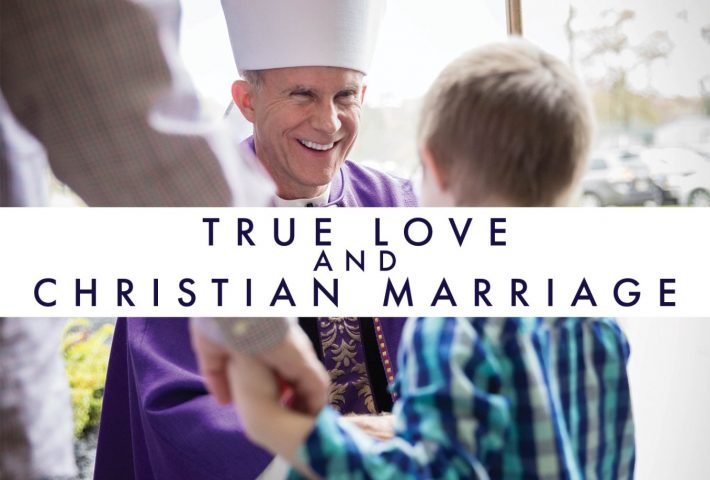Archives: Bishop Joseph E. Strickland: True Love and Christian Marriage

The Babies in the ‘Breyer Patch’, by Judie Brown
May 18, 2019
Archbishop Aquila: Vocations Are Given, Not Manufactured
May 18, 2019
By Bishop Joseph E. Strickland, Catholic East Texas, May 16, 2019
This article was originally published in Volume 31, Issue 3 of the print edition of the Catholic East Texas
In this issue of the Catholic East Texas Magazine, we turn our attention to topics that lie at the very core of what it means to be human. Life is the most foundational gift that our Lord gives us. New life comes to us in a beautiful way: “a man leaves his father and his mother and clings to his wife, and they become one flesh” (Genesis 2:24). In the marital act, when the two become one flesh, this beautiful expression of love cooperates with the creative power of God to produce a new human being. The parents provide the genetic material, while our heavenly Father creates the immortal soul. This year marks the 50th anniversary of Blessed Pope Paul VI’s landmark encyclical Humanae Vitae. Written in 1968, this encyclical was prophetic, bold, and faithful in handing on the truth about love and human life. Such is the inspiration for my reflections and for this issue of the Catholic East Texas.
I ask all Catholics, especially married Catholics, to read this issue prayerfully. The articles herein will help to clarify and renew in our hearts the Church’s beautiful teachings, which we have received from the Lord Jesus himself. Reflect on your marriage, and how you can live out Christian marriage. Be open to embracing what true love is, the life it brings forth, and how it is lived out in the Christian life.
True Love
“Greater love has no man than this, that a man lay down his life for his friends” (John 15:13)
The world teaches us that love is something you feel. If love is those warm fuzzy emotions, what does that mean for marriage? The New Testament and Holy Mother Church teach us that true love is sacrificial. The primary expression of love is not embracing feelings of affection; it is embracing the rough wood of the cross. So it is with marriage.
The fact is that love is not limited to those feelings and emotions. God gives us the emotions so often tied to love to remind us of the joy which love brings about. Very often, though, we find that love is difficult. Indeed, very often true love is difficult. Those feelings and emotions are not love. Love is a choice.
To learn about love, to study in the school of love, is to meditate on the cross of Christ. I urge you: look to the cross. Be sure to hang a cross (or better yet, a crucifix) in your home, that you may constantly look upon the most perfect image of true love. Prayerfully strive to go to your own cross in your marriage. Sometimes you’ll feel the emotions of love, but not always. When those feelings fade, when you haven’t slept and the baby is crying, look to the cross. When you and your spouse choose not to enter into the marital embrace (to space out your children, for example), look to the cross. When the marital act has brought new life in this world, and you don’t know if you can handle it, look to the cross.
The cross is true love. True love is a total gift of yourself. It is not butterflies in your stomach; nor is it the emotions of romance. True love is climbing the mountain of Calvary; true love bleeds; true love gasps for breath as it hangs from the cross of sleep deprivation, of unruly children, of unplanned pregnancy. True love is a sacrificial gift of yourself to your children, your spouse, your God. Therefore, we must all strive, and strive hard, to make our lives conform to the cross of Christ.
Consequently, divorce is never an option for Catholics who have “fallen out of love,” because true love is not something one “falls” into or out of. Marriage is total and is only dissolved in death. Jesus’ death on the cross is our example: he gave everything to his bride, the Church. Let your marriage mirror his sacrifice, in the good times and bad; in sickness and health; until death do you part. “What therefore God has joined together, let no man put asunder” (Matthew 19:6). Many have experienced the brokenness which divorce brings about, and the Church treats them with compassion while seeking to help hurting marriages avoid this pain.
Love Under Attack
“If the world hates you, know that it has hated me before it hated you”
(John 15:18)
Today, though not for the first time in history, these fundamental realities of love, life, and marital union are under attack. Our society has wholesale rejected the permanence of the marriage bond. Spouses voluntarily sabotage their most intimate relations. Unborn children are dehumanized and murdered in the hundreds of thousands each year (in the United States alone).
Again, love and romantic feelings of affection are different things. A marriage is not built on affection—feelings which can fade—but on the mutual gift of self. That is, each spouse totally pours himself or herself out for the other. This total self-gift between man and woman was designed by God to have a concrete and tangible result. The love between man and wife can be so substantial that it gives life. Far from being a small or accidental part of spousal love, fertility is one significant way in which humans can mirror and participate in the creative power of God. When spouses intentionally hold back this aspect of their love, they frustrate the plans God has for their marriage.
Let me state it plainly: contraception is a grave sin.
There are various kinds of contraception on the market today, including condoms, the Pill, IUDs, sterilizations, vasectomies, masturbation, and certain positions that can never lead to pregnancy. Again, it is worth repeating: All of these methods of contraception are gravely evil. Some, like IUDs, even cause abortions. If you have ever, or if you currently do, use any artificial contraception, for the sake of your soul I urge you to stop using artificial contraception, and abstain from communion until you can go to confession.
I think all married couples know—and I have already said above—that marriage is not a simple walk through the park. It involves sacrifice; but your spouse is worth sacrificing for. Embrace love. Embrace the cross. Embrace your marriage. Statistics show that couples who contracept are far more likely to divorce. Part of the reason behind this is the fact that contraception is an intentional refusal to give oneself entirely to their spouse. What marriage can last if the couple intentionally sabotages true love?
True love also requires sacrifice. In marriage, sometimes that sacrifice comes in the form of periodic abstinence. Abstaining from the marital act can at times be the most loving and self-less thing spouses can do, and it is a way of living God’s plan for marriage. I’m not here to say that this will ever be easy. No, it certainly is a cross. This unfulfilled desire is truly a suffering; but your marriage is worth it. Your family is worth it. Your soul is worth it.
Some couples, including some unmarried people who have chosen to enter into the marital act before being married, find themselves in a position of an unplanned or even “crisis” pregnancy. No matter the circumstances, abortion—the intentional murder of an innocent child—is never an option. There are very rare medical circumstances where the life of the child cannot be saved, but this is greatly different from abortion. Abortion and abortifacient methods of contraception (like IUDs) are among the greatest evils in our world today. We must resist the temptation that the world places before us. We must look at the child (whether it is a single-celled embryo or a fully formed fetus) as an innocent human person. An unplanned pregnancy can be a cross; however, it should be embraced, not discarded.
In most contexts, people today know that murder of innocent humans is wrong. However, our society has decided that certain groups of people are not human or do not have all the rights which humans have. This is called dehumanization. Look to the last 100 years of the world’s history to see the grave evils and great atrocities that result from dehumanization.
Other couples suffer at the cross of infertility. Their struggle is certainly different from those who willingly withhold their fertility from their spouse or reject the fertility of their spouse. Couples suffering from infertility—as well as couples abstaining from the marital act and couples with an unplanned pregnancy—are called by God to prayerfully unite their sufferings to the sufferings of Christ.
Unite Your Spousal Love to the Love of Christ
“Now I rejoice in my sufferings for your sake, and in my flesh I complete what is lacking in Christ’s afflictions for the sake of his body, that is, the Church” (Colossians 1:24)
You can unite your sufferings to the sufferings of Christ in private prayer anytime and anywhere. However, there is a very specific part of the Holy Mass that is especially appropriate for this. After the Creed and the Prayers of the Faithful, as the altar is being prepared for the Liturgy of the Eucharist, this is the time most especially when couples suffering should prayerfully unite their sufferings to the offering of bread and wine. The bread and wine in only a few minutes will no longer be bread and wine: it will be changed into the Body, Blood, Soul, and Divinity of Jesus Christ.
At this moment, if you have offered your troubles on the altar with the bread and wine, your sufferings will be united to Christ’s. “I have been crucified with Christ, and it is no longer I who live, but Christ who lives in me” (Gal. 2:20). By uniting our sacrifices to the Holy Sacrifice of the Mass, and then receiving communion in the state of grace, God empowers us to live out our vocations. For me as a bishop, and for my brother priests, it is total continence. For married couples it may be occasional continence.
The eternal Son of God came down from heaven, became flesh in the womb of Mary, and showed us what it means to love. Jesus, fully God, became what we are and enables us to be unified to God through him. “For we have not a high priest who is unable to sympathize with our weaknesses, but one who in every respect has been tempted as we are, yet without sinning” (Hebrews 4:15). Jesus’ life on earth began where all human life begins: in the womb. We must maintain respect and sanctity toward the beginning of life. Life is from God. Life is sacred. Any interference that frustrates God’s plan for human life and marriage is wrong.
Living out Christian marriage is a cross. United to the cross of Christ, it is not an instrument of torture, but an instrument of redemption.




